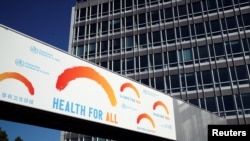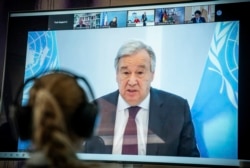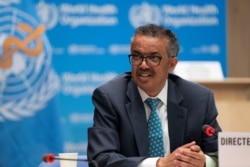World leaders attending the first-ever virtual World Health Assembly have called on nations to unite to defeat the COVID-19 pandemic. Since the first cases of the deadly disease were declared in China in December, the WHO has reported more than 4.7 million infections around the world, including more than 315,000 deaths.
U.N. Secretary-General Antonio Guterres opened this virtual assemblage of world leaders with a stark warning. He said nations were likely to face a future of fear and insecurity unless the spread of the deadly ailment was stopped everywhere. The coronavirus causes the COVID-19 disease.
So far, COVID-19 has largely created social and economic havoc in the world's richer countries. But Guterres said the virus was now moving into the global South, where its impact could be even more devastating.
He urged international support for the World Health Organization, saying its role in leading the global fight against the pandemic was irreplaceable. He said the WHO needs more funds to support developing countries, which he considered to be of greatest concern.
"We are as strong as the weakest health systems. Protecting the developing world is not a matter of charity or generosity but a question of enlightened self-interest. The global North cannot defeat COVID-19 unless the global South defeats it at the same time."
The WHO has been under fire from the administration of U.S. President Donald Trump for its management of the coronavirus crisis. The United States suspended funding to the agency in April, accusing it of deferring to China.
Chinese President Xi Jinping, stung by the U.S. accusation that Beijing tried to cover up the crisis, described what he said were the painstaking efforts and sacrifices made by his people, which has turned the tide on the virus.
"All along, we have acted with openness, transparency and responsibility," Xi said through an interpreter. "We have provided information to the WHO and relevant countries in a most timely fashion. We have released the genome sequence at the earliest possible time. We have shared control and treatment experience with the world without reservation."
Xi declared what he said was his unqualified support for the WHO and its director-general, Tedros Adhanom Ghebreyesus. Xi said his country would contribute $2 billion over the next two years to support the COVID-19 response.
French President Emmanuel Macron also supported WHO's coordinating role and scientific expertise in tackling COVID-19.
He said France would substantially increase its financial contribution to WHO. Additionally, he said his government was joining with the WHO, European Union and other partners to support research for a vaccine and other COVID-19 tools.
"If we do discover a vaccine against COVID-19, it will be a global public good and everyone must have access to it," Macron said through an interpreter. "This is a question of effectiveness really. As long as the disease remains a threat to a few, it will remain a threat for everybody."
Leaders of other countries, including Germany, South Korea and Barbados, agreed with these sentiments and those of South African President Cyril Ramaphosa, who said everyone needed to act in solidarity for the millions of people around the world.
WHO chief Tedros concluded the high-level segment noting there were lessons to be learned from the pandemic.
"So, I will initiate an independent evaluation at the earliest appropriate moment to review experience gained and lessons learned, and to make recommendations to improve national and global pandemic preparedness and response," he said.
Tedros said the biggest lesson was to know what must be done to make sure another pandemic like this never happens again. He said the world must never again be left in the same vulnerable state.







